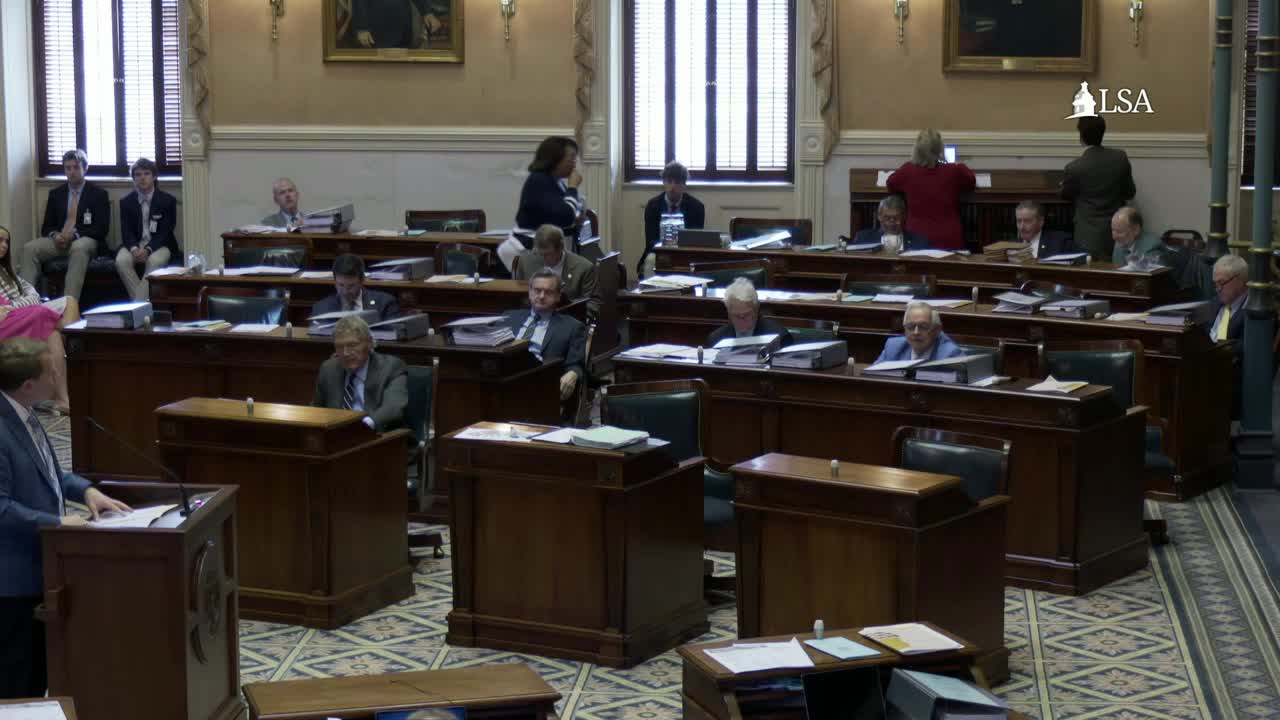Senate debate centers on structure, oversight of proposed Education Scholarship Trust Fund
Get AI-powered insights, summaries, and transcripts
Subscribe
Summary
The South Carolina Senate spent a large portion of its floor session debating a proposal to create an Education Scholarship Trust Fund to deliver state-supported scholarships for children to attend nonpublic K–12 schools.
The South Carolina Senate spent a large portion of its floor session debating a proposal to create an Education Scholarship Trust Fund to deliver state-supported scholarships for children to attend nonpublic K–12 schools. Senators sparred over who should control program rules, how a trustee would be appointed and paid, and whether the approach would withstand judicial review.
Senator Martin (Senator from Spartanburg) framed one amendment as protective of existing scholarship commitments, saying, “My amendment in no way attempts to alter or undo any of the main objectives of this bill” and adding the change “simply confirms that promise” that lottery proceeds would first cover higher-education scholarships before other uses. Martin said his amendment sought to clarify sources and ordering of the fund’s revenues and to return any funds that could not be legally used to education purposes rather than to the general fund.
Opponents warned the changes could reopen the bill to constitutional challenge. Senator Hembry (Senator from Horry) said he had “grave concerns that if we adopt this amendment, that it will in fact, leave us open to yet another constitutional challenge,” citing the court decisions that shaped earlier drafts and the need to follow the high-court guidance.
Senators and questioners pressed for specifics about how the trust would operate. Floor discussion reflected these points from the bill text and committee testimony: the state superintendent of education would appoint the trustee (the trustee may not be a public entity or state employee), the trustee would administer payments to vendors at the parents’ direction, payments would be disbursed on a quarterly schedule tied to student counts, and up to 5 percent of the program money could be used for administration (including trustee payment). The transcript shows senators asking whether the trustee’s fee would come from that administration cap, how the trustee would be selected and removed, and whether funds held by a trustee could be reclaimed if the trust were later declared unconstitutional.
Senator Martin described the trustee mechanism as an attempt to follow guidance in recent judicial decisions. He told colleagues that the trustee would confirm student eligibility before each quarterly disbursement and that the trust’s money would be returned to a restricted special education fund (not the general fund) if a court found the program unconstitutional. That treatment, he said, was intended to address concerns raised in prior litigation and the court’s treatment of direct transfers.
Other senators pressed on operational risk and accountability. Questions included whether a future superintendent could change or remove a trustee, what safeguards would exist against a trustee having a financial relationship with vendors, and whether the department or the trustee would have final authority to determine allowable uses of scholarship money. Senator Calhoun and others asked whether the trust structure would give the state sufficient oversight and whether the money might effectively leave direct public control once transferred.
The particular amendment debated on the floor (sought by Senator Martin) would have required lottery-ticket revenues to first fund higher-education scholarships and would specified how funds revert if the trust ends. The Senate rejected a motion to remove that amendment’s first section when Senator Henry’s tabling motion prevailed. The tabling motion on the amendment passed by roll call, 21–10.
Procedural status: by unanimous consent the Senate agreed to give the bill a second reading today and to carry over roll-call votes to third reading; several amendments were discussed and one significant amendment was tabled by roll call. Further action on the bill was preserved for the next stage of the calendar.
The debate combined legal caution with budget and program-design questions: supporters argued the trustee model and revenue ordering were intended to conform the program to recent court guidance; opponents and questioners warned that gaps in definitions, trustee selection, or discretionary “allowable expenses” language could create legal and fiscal risk and urged clearer statutory limits and selection transparency for the trustee.
The bill’s authors and senators repeatedly pointed to recent case law (referred to in debate as the Edison litigation and related opinions) as the reason for the trustee approach; senators also noted the program could be funded from the education lottery, the general fund or a mix depending on the budget and legal outcomes and that the trust model was intended to give the program operational structure while preserving legal compliance.
Looking ahead, the bill remains on the Senate calendar for third reading and further amendments. The roll-call tabling vote and several questions on trustee selection, trustee compensation, administrator authority and allowable expenses indicate the Senate will need further legislative detail or implementing guidance to address concerns raised on the floor.
